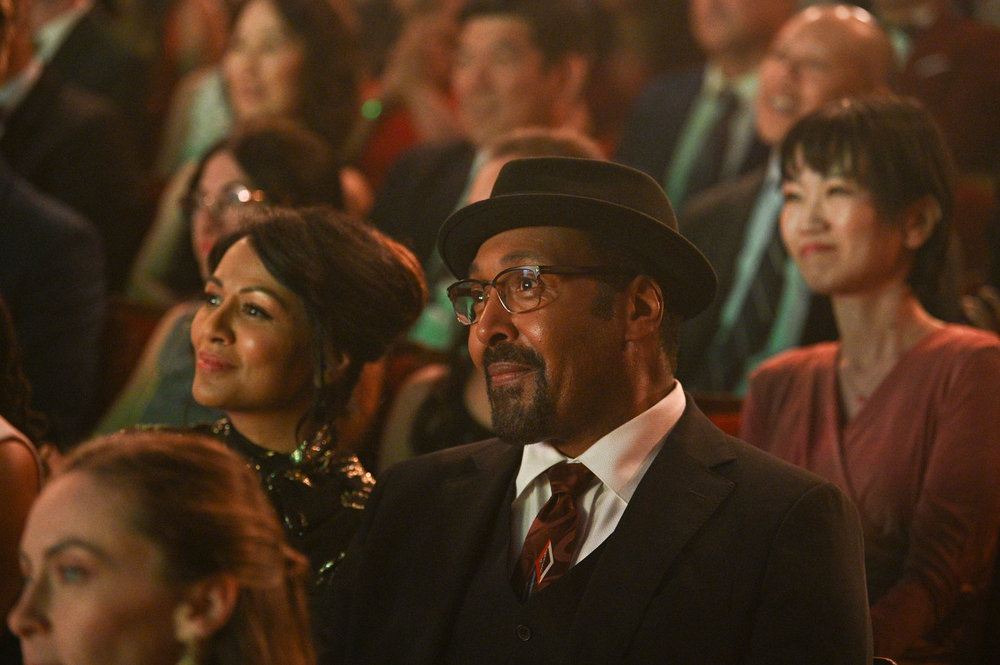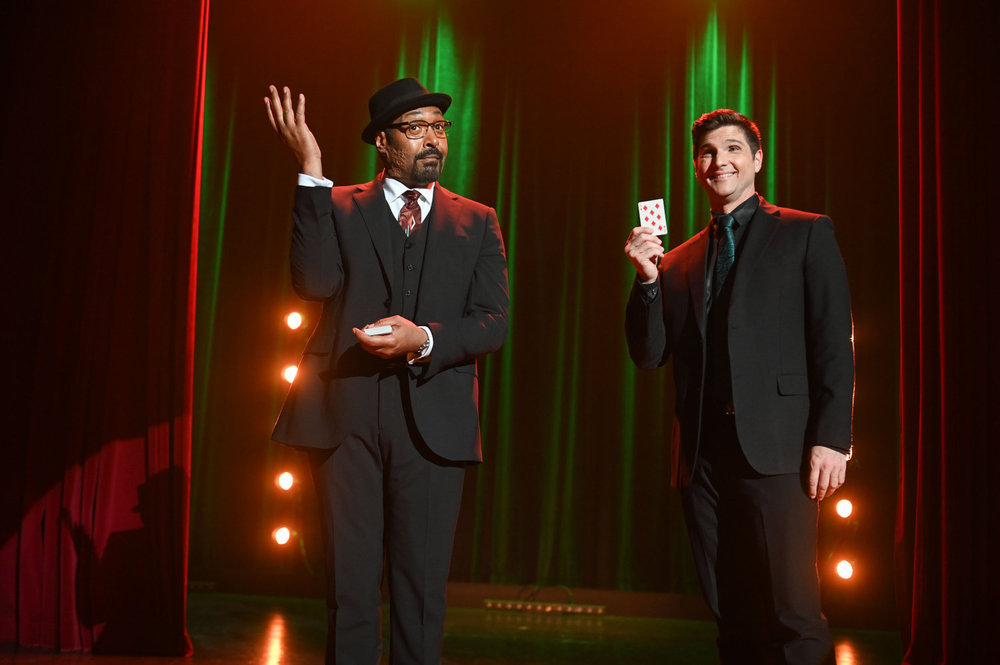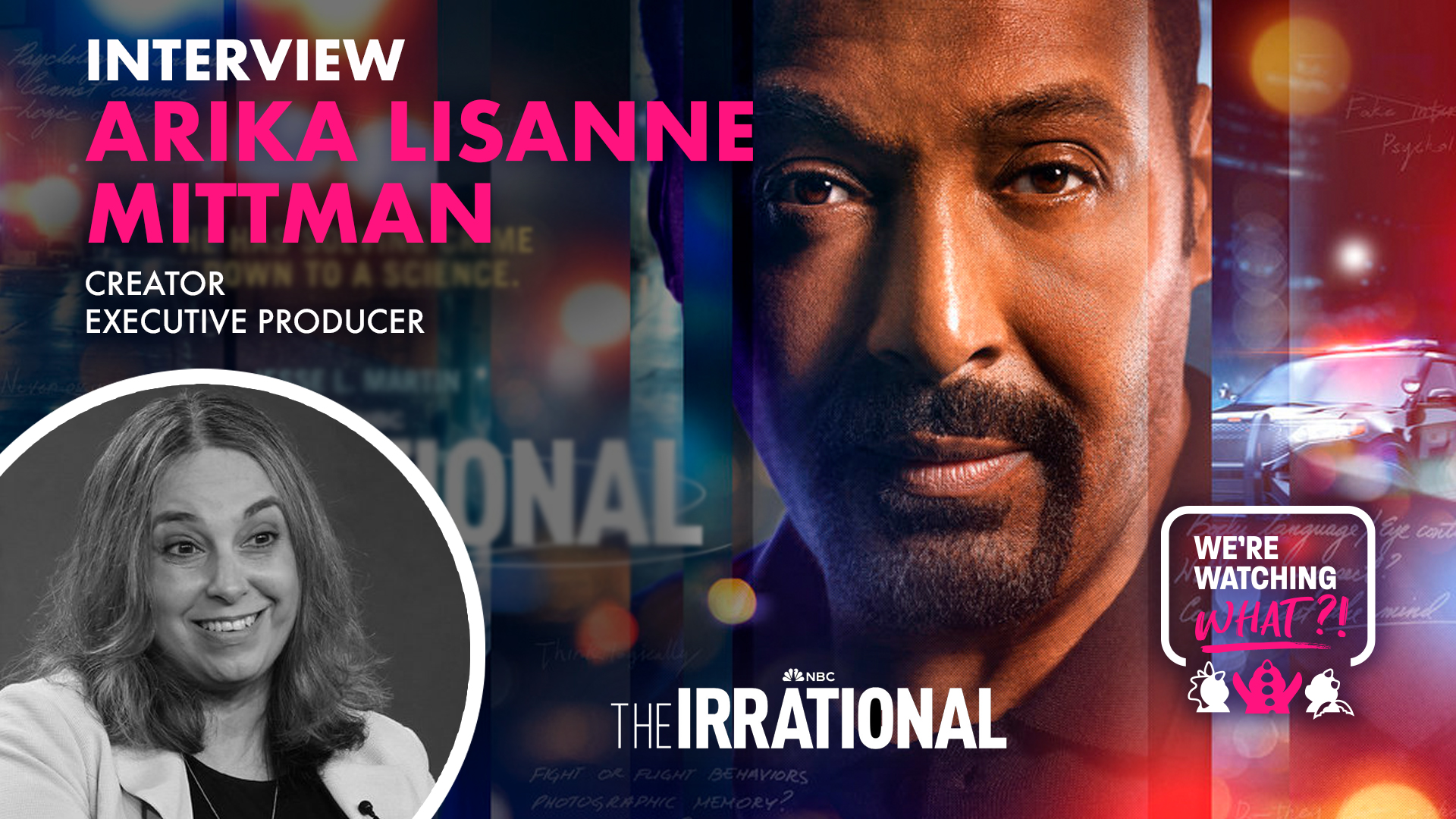The Irrational creator and executive producer Arika Lisanne Mittman is no stranger to the world of crime procedurals. Her latest series is now well into its second season and she’s here to do the time on writing the crimes.
Interview has been edited for clarity and length.
The Irrational Season 2
DHK: I’m going to leap right in. What is something that you all learned from season one that you were excited to apply to season two of The Irrational?
Arika Lisanne Mittman: I would say, one thing we learned was how much people loved our exciting case of the week stories. So we’ve leaned a little more in the case of the week, more so than, serialized mysteries, so that people don’t feel like they have to, you know, follow something throughout the course of the season or kind of keep track of all the details and something people really like.
People really like those closed ended traditional, mystery stories. That’s one thing. Another thing we learned was that the character of Alec had great chemistry with Karen David, with the character of Rose. So, we we’re going to put them together more, in stories in the future.

DHK: I am always curious. What is the most fascinating thing that you learned in all the research into the show about behavioral science? What is your new, like, dinner party fun fact?
ALM: That is so true. You do learn so much. We do learn so much making the show every episode. My favorite thing that I learned, about behavioral science, is about memory. Actually. just the fact that we can’t trust our memories, how unreliable memory really is. The fact that memory works the same way as imagination – that comes up in the pilot.
But, that fact (also) comes up again and again. We used it in our second episode this season, when we talked about the unreliability of witnesses in crime investigations, and it’s really not that anybody has the intent to, to lie, per se. It’s just that our memories start changing the minute we pass the moment and for a variety of reasons.
And that was the most interesting thing to me, that memory is completely unreliable.
DHK: Knowing that, how does that impact your writing process? Or like the writers room? Are you all like, do you remember taking notes? Did anyone put this on the board? Or is it just like, maybe not gaslighting yourself, but does that ever come into account?
ALM: [Laughing] I mean, fortunately, we have a great team. We have great writers assistants who take notes at every meeting, so everything is pretty well documented. We don’t really have too many opportunities in the room to wonder if. I mean, any more than what any one wonders on any given day, am I remembering that correctly? We fortunately have sources to track.
But yeah, I mean we will remember you know, but I’ll say what’s tricky in a writer’s room is sometimes remembering which one is the final version that ended up on TV, cause there are things that we come up with in the room that get talked about. And then there’s the, you know, the things that get rewritten in the script and the things that get changed in editing and you’ll be saying, oh, this happened.
Remember this character? and it’s like actually that got cut or that got changed. That’s not what aired. And oh right! You know, I think that what happens is that sometimes we remember different versions of things. That happens.
DHK: That’s why, you know, writers assistants – shout out to them. And also, how do we get one of those in our, all of our everyday lives?
So one of the things I love about the show is that it’s a super diverse cast and, I think especially in crime procedurals, there’s usually been a bit of tokenism, but this is actually front and center.
So I’m curious, for your part, what is the first time you felt represented on TV, if ever?
ALM: Oh, great question. As you know, and a gay woman… one of my first jobs was on a show called South of Nowhere, which was a teen soap that featured a lesbian character at the center of it. And it was one of the… It was maybe the first time that had ever been done.
And I got to write on that show, and that was amazing because our show had not only, you know, a bunch of teen fans and obviously it was paired with things like Degrassi, so it certainly got a share of teen audiences.
But I found a lot of the audience was like, forty year old lesbians who we’re like, “we’ve never seen ourselves on TV!” We didn’t get stuff like this when we were teenagers, and that was myself included in it. We didn’t get shows like that when I was a teenager.
So it was very exciting to write on a show that featured those characters, as to the first time I ever saw representation, you know, in that regard, I do remember oh my god, this is going to date me, by the way.
When I was in high school, they featured a love story with two women on the show: L.A. Law. It was one of the first times it had been done, and I was super excited about it. It was before I had even come out. Like, I think I could explain why I was so excited about it, but I was very excited about that.
DHK: Speaking of growing up, who was your favorite fictional character?
ALM: Who is my favorite fictional character growing up? Oh, wow. That was a question, but, but I will say my favorite TV show when I was growing up, was Moonlighting. Okay. (DHK laughing) So the love story of Maddie and David and, you know, the, the, the, the episodic mysteries. I loved them then. I love them now.
So, you know, that really hasn’t changed. I don’t know if I had a specific favorite… My favorites rotated. I was also a big soap fan, so I had favorite characters on Days of Our Lives and whatnot throughout my childhood. So, they probably changed quite a bit. I don’t think I had one consistent favorite fictional character.
So I did read a lot as well. My favorite book was Are You There, God? It’s Me, Margaret, when I was a little kid. So I was like, they just so you know. But I don’t know that I could say offhand a specific favorite fictional character. I’d have to think about that one.
DHK: How do you define personal success now, and how does that change from earlier in your life or career?
ALM: That’s a great question.
DHK: I could have warned you, these get a little therapy-y
ALM: I know, wow! wow I think. I think I had defined I mean, I think that a younger me would definitely have, you know, that going back to my favorite show was Moonlighting. Well, when I was watching Moonlighting as a kid, I remember reading in all the tabloids that Cybil Shepherd and Bruce Willis and Glen Caron didn’t get along. And I was like, hold up who’s this Glen Caron person?
And then I understood, oh, okay, he’s the writer. He wrote all that. That’s amazing. Writer, showrunner, executive producer. I want to do that. So that was definitely a goal of mine for a long time. And then I achieve that goal. Now I think, you know, that getting the career goal that you work for is definitely a version of success.
But I think more about like, what can I do? What can I do with that success? Like how can I change people’s hearts and minds? How can I give people something to think about? How can I better represent, you know, minorities? How can I better represent, you know, LGBTIA+? How can I do things with this?
With what we have: which is television. We are the media that goes into people’s homes in a way that you that other in a way that other media doesn’t like. We’re in your living room. We’re there. And how can I use that? How can I use that to help to help society?
DHK: My very last question is, is there a crime you think that you would be able to pull off as you after having studied all of this?
ALM: Oh my gosh. I’ve actually thought about that. I’ve actually have thought about like, you know, like, could I, could I murder someone and get away with it? I mean.
DHK: Damn, I mean, you can jump straight to murder if you want? Or you can go, ya know petty theft too.

ALM: I would say I certainly never tried to, you know, I mean, it’s funny, – one of the challenges of writing a show like that. And, I noticed that when I used to write for a show called Elementary is when the characters are smarter than you, and you’re like, okay, I need to write for the smartest person in the world, which I’m definitely not.
So like, you know, I think that it has made me smarter. I do think that there’s not a crime per se, but I definitely feel like I could manipulate people with all of the things that I know about human nature at this point.
DHK: Amazing. Put it under a special skills.
